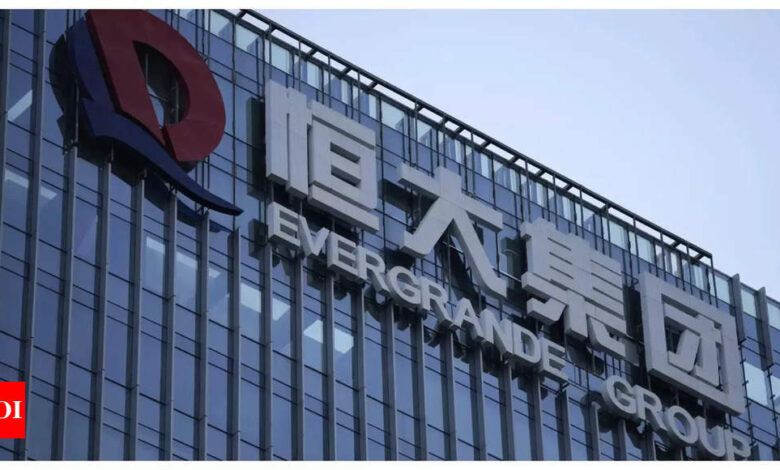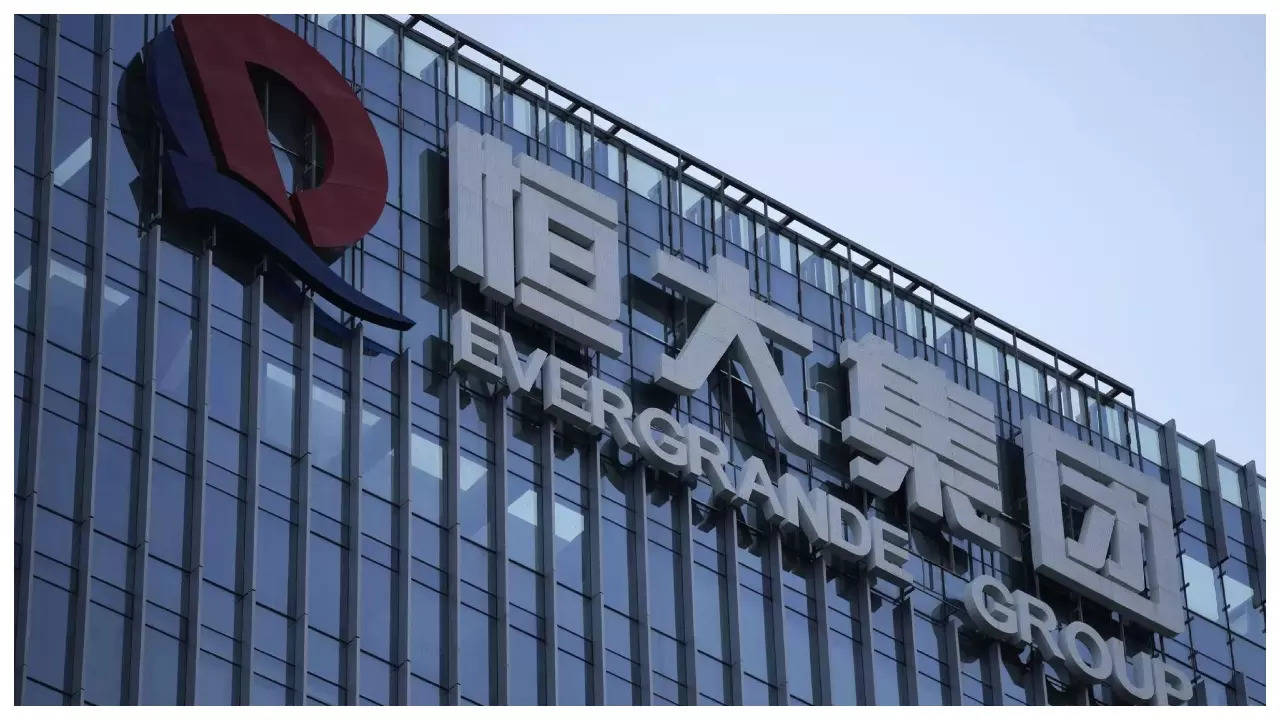Business
China accuses Evergrande of $78 billion fraud, among worst ever

[ad_1]
China Evergrande Group‘s alleged $78 billion revenue overstatement escalates the legal peril of founder Hui Ka Yan, who now stands at the center of one of the biggest financial fraud cases in history.
The nation’s top securities regulator said the developer’s onshore unit inflated revenue by recognizing sales in advance in the two years through 2020 that led up to its default.It imposed a 4.18 billion yuan ($581 million) fine against the unit.
Evergrande’s alleged fraud dwarfs that of Luckin Coffee Inc. and Enron Corp., dealing a blow to the reputation of its former auditor and the country’s financial oversight. It fuels concern about how widespread such accounting issues are, just as the new China Securities Regulatory Commission chairman is trying to tighten oversight.
“The CSRC fines may serve as a warning to owners of other defaulted developers that failing to collaborate with authorities over debt restructuring could
The allegations mark the latest blow for Hui, once among Asia’s richest tycoons, who oversaw a sprawling empire that spanned real estate to electric vehicles. Evergrande was one of China’s biggest developers, taking on massive debt to expand across the country as condo sales boomed. The group received a liquidation order from a Hong Kong court in January, marking the largest collapse in China’s three-year real estate crisis.
The CSRC’s action may pave the way for more serious charges against Hui, who was detained by police last year due to “suspicion of illegal crimes.” No criminal charges against Hui have been made public and his whereabouts aren’t known. The levies are administrative penalties.
The CSRC laid much of the blame on Hui, who it alleges instructed other personnel to “falsely inflate” annual results. The onshore unit Hengda Real Estate Group boosted its 2019 revenue by about 214 billion yuan, and another 350 billion yuan in 2020, the regulator said.
“The alleged fraud is shocking in its scale,” said Brock Silvers, managing director at private equity firm Kaiyuan Capital. “Hui became an expected civil and criminal target as soon as Evergrande was ordered into liquidation.”
As the supervisor in charge, Hui used particularly “egregious” means, the regulator said. Hengda was also accused of fraudulently issuing a combined 20.8 billion yuan in bonds using these figures in marketing.
Hengda’s auditor in 2019 and 2020 was PricewaterhouseCoopers Zhong Tian LLP, a mainland entity affiliated with PwC’s network. PwC resigned as Evergrande’s auditor in January 2023 due to audit disagreements.
The CSRC’s fine against Hengda, while among the largest ever in China, trails that of the 7.1 billion yuan slapped on fintech giant Ant Group Co. for policy violations.
Hui was fined 47 million yuan for the falsified results and other alleged violations, and banned for life from capital markets activities. Other former executives Xia Haijun and Pan Darong were also among people punished with fines and market bans.
The regulatory action comes as China continues to grapple with a property downturn that has eroded economic growth and household wealth, as home sales and prices tumble. A Bloomberg gauge of China developer stocks dropped as much as 1.1% in early trading on Tuesday, taking losses to 54% in the past year.
‘Good Thing’
Some investors welcomed the CSRC’s move, seeing it as a positive step for financial regulation. “This is a good thing,” said Yu Yingdong, general manager at Shenzhen Cowin Asset Management Ltd. Regulators are expected “to keep the pressure on in the future.”
The inflated figures accounted for half of Hengda’s total revenue in 2019, and 79% in 2020, according to the regulator. The developer’s profits were exaggerated by 63% and 87% respectively in those two years, the regulator said. Hui was responsible for delays in publishing Hengda’s earnings reports and failures to disclose the lawsuits it faced, as well as unfulfilled debt payments, the CSRC added.
Once Asia’s second-richest man, worth $42 billion at his peak in 2017, Hui has seen his wealth plummet to about $1 billion after the developer defaulted in 2021. Evergrande’s stock has tumbled and was eventually suspended from trading.
Meanwhile, another Hong Kong mansion tied to Hui has been put up for sale. The luxury property, 10E on Black’s Link in the prestigious Peak area, is seeking bidders before a tender ends on April 22, Savills Plc said in an emailed statement.
The nation’s top securities regulator said the developer’s onshore unit inflated revenue by recognizing sales in advance in the two years through 2020 that led up to its default.It imposed a 4.18 billion yuan ($581 million) fine against the unit.
Evergrande’s alleged fraud dwarfs that of Luckin Coffee Inc. and Enron Corp., dealing a blow to the reputation of its former auditor and the country’s financial oversight. It fuels concern about how widespread such accounting issues are, just as the new China Securities Regulatory Commission chairman is trying to tighten oversight.
“The CSRC fines may serve as a warning to owners of other defaulted developers that failing to collaborate with authorities over debt restructuring could
The allegations mark the latest blow for Hui, once among Asia’s richest tycoons, who oversaw a sprawling empire that spanned real estate to electric vehicles. Evergrande was one of China’s biggest developers, taking on massive debt to expand across the country as condo sales boomed. The group received a liquidation order from a Hong Kong court in January, marking the largest collapse in China’s three-year real estate crisis.
The CSRC’s action may pave the way for more serious charges against Hui, who was detained by police last year due to “suspicion of illegal crimes.” No criminal charges against Hui have been made public and his whereabouts aren’t known. The levies are administrative penalties.
The CSRC laid much of the blame on Hui, who it alleges instructed other personnel to “falsely inflate” annual results. The onshore unit Hengda Real Estate Group boosted its 2019 revenue by about 214 billion yuan, and another 350 billion yuan in 2020, the regulator said.
“The alleged fraud is shocking in its scale,” said Brock Silvers, managing director at private equity firm Kaiyuan Capital. “Hui became an expected civil and criminal target as soon as Evergrande was ordered into liquidation.”
As the supervisor in charge, Hui used particularly “egregious” means, the regulator said. Hengda was also accused of fraudulently issuing a combined 20.8 billion yuan in bonds using these figures in marketing.
Hengda’s auditor in 2019 and 2020 was PricewaterhouseCoopers Zhong Tian LLP, a mainland entity affiliated with PwC’s network. PwC resigned as Evergrande’s auditor in January 2023 due to audit disagreements.
The CSRC’s fine against Hengda, while among the largest ever in China, trails that of the 7.1 billion yuan slapped on fintech giant Ant Group Co. for policy violations.
Hui was fined 47 million yuan for the falsified results and other alleged violations, and banned for life from capital markets activities. Other former executives Xia Haijun and Pan Darong were also among people punished with fines and market bans.
The regulatory action comes as China continues to grapple with a property downturn that has eroded economic growth and household wealth, as home sales and prices tumble. A Bloomberg gauge of China developer stocks dropped as much as 1.1% in early trading on Tuesday, taking losses to 54% in the past year.
‘Good Thing’
Some investors welcomed the CSRC’s move, seeing it as a positive step for financial regulation. “This is a good thing,” said Yu Yingdong, general manager at Shenzhen Cowin Asset Management Ltd. Regulators are expected “to keep the pressure on in the future.”
The inflated figures accounted for half of Hengda’s total revenue in 2019, and 79% in 2020, according to the regulator. The developer’s profits were exaggerated by 63% and 87% respectively in those two years, the regulator said. Hui was responsible for delays in publishing Hengda’s earnings reports and failures to disclose the lawsuits it faced, as well as unfulfilled debt payments, the CSRC added.
Once Asia’s second-richest man, worth $42 billion at his peak in 2017, Hui has seen his wealth plummet to about $1 billion after the developer defaulted in 2021. Evergrande’s stock has tumbled and was eventually suspended from trading.
Meanwhile, another Hong Kong mansion tied to Hui has been put up for sale. The luxury property, 10E on Black’s Link in the prestigious Peak area, is seeking bidders before a tender ends on April 22, Savills Plc said in an emailed statement.
#China #accuses #Evergrande #billion #fraud #among #worst






